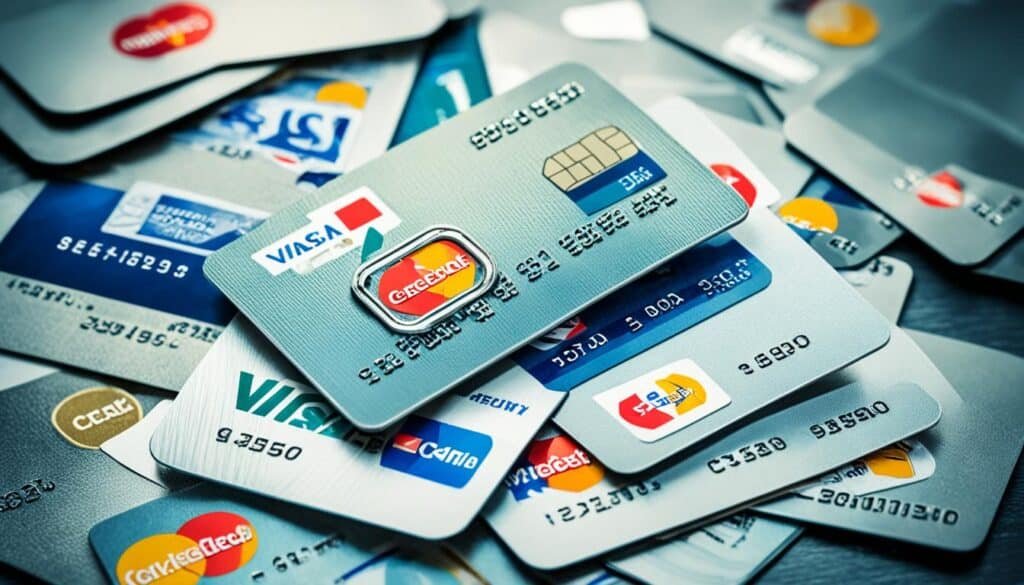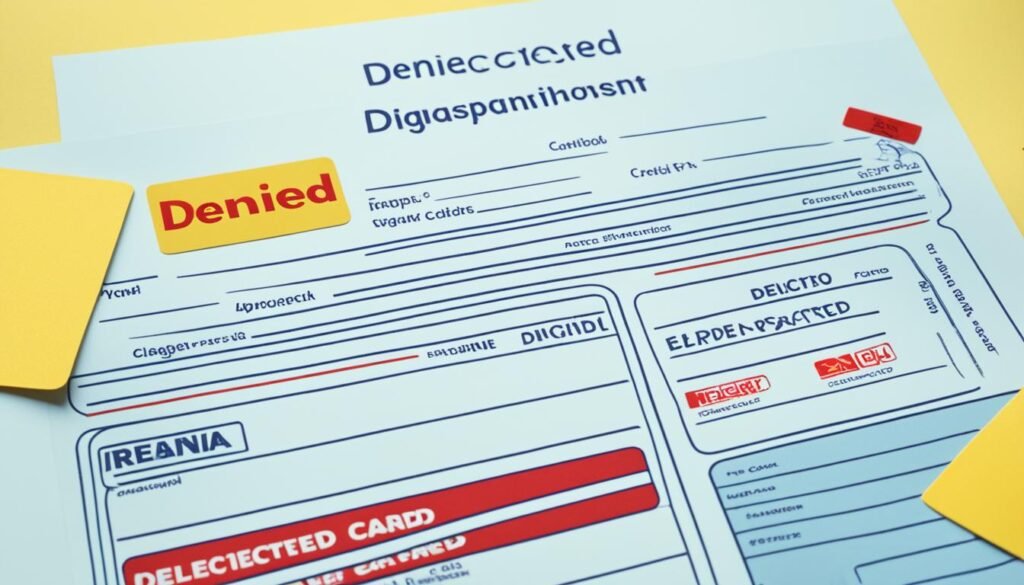What Should I Do If My Credit Card Application Is Denied?
Getting a ‘No’ on your credit card application can be upsetting. But, it happens to many people and doesn’t always mean you’re not trustworthy with money. Common reasons for being denied a card are having a low credit score, too much debt compared to your income, not much of a credit history, and bad info on your credit report. If you’re found yourself denied, don’t worry. There are things you can do to turn it around and better your chances next time.
Key Takeaways : Credit Card Application
- Review your credit report to identify any errors or inaccuracies that may have contributed to the denial.
- Focus on improving your credit score by paying down debt, making on-time payments, and reducing your credit utilization rate.
- Explore alternative credit card options, such as secured cards or cards designed for individuals with fair or poor credit, to build or rebuild your credit history.
- Be strategic about the timing of your next credit card application, waiting until you’ve had a chance to improve your credit profile.
- Seek professional assistance from credit counseling services or financial advisors if you need additional guidance.
Understanding the Reasons for Denial
If you’re denied your credit card application, knowing why can help. It’s often due to a low credit score, a high debt-to-income ratio, thin credit history, or bad info on your report.
Low Credit Score
A credit score below 670 is seen as low. This can keep you from getting the best credit cards. Lenders might see you as someone risky to loan money to.
High Debt-to-Income Ratio
If what you owe is too much for what you earn, it’s a red flag. It shows lenders you might have trouble paying more back.
Limited Credit History
Not having much experience with credit can also hurt. Lenders like seeing a proven track record of managing credit well. This makes you less risky in their eyes.
Negative Credit Report Information
Bad things on your credit report like late payments or bankruptcies can be damaging. They lower your creditworthiness, possibly leading to rejection.
Reviewing Your Credit Report

After a credit card denial, start by checking your credit report. You can get a free copy from the major credit bureaus (Experian, Equifax, and TransUnion) every year. This shows you what led to the denial.
Obtaining Your Free Credit Report
Go through your report carefully. Look for any mistakes that might lower your score. Getting your free credit report helps make sure what lenders see is correct.
Identifying Errors and Inaccuracies
Check for wrong details, like missed payments that were actually on time. Mistakes in your credit report, such as incorrect collections or credit limits, can hurt your credit score.
Disputing Incorrect Information
If you spot errors, you can dispute them with the credit bureaus. Provide proof to back up your claim. Fixing these mistakes can better your credit and help you get approved for credit cards in the future.
Improving Your Credit Profile

To improve your credit profile, start paying off what you owe. This lowers your credit utilization rate, which affects your credit score. It’s also vital to pay your bills on time. Your payment history impacts your score the most.
Try to keep the ratio of your debt to available credit under 30%. This shows you manage credit well. These steps build a stronger credit profile. They can help you get a new credit card with better odds.
Paying Down Credit Card Balances
Reducing what you owe on your credit cards is key. It lowers your credit utilization rate and improves your score. Strive to not use more than 30% of your available credit. This proves you’re good at handling credit and boosts your card approval chances.
Making On-Time Payments
Paying on time each month is a must for good credit. Your history of payments is critical. Keeping up with due dates makes you look more reliable to lenders.
Reducing Credit Utilization Rate
Your credit utilization rate affects your score too. Lenders like to see this rate at 30% or less. It shows you’re using credit wisely. Lowering it can better your credit profile. This may improve your chances for a new credit card approval.
Requesting Reconsideration

If you think you got rejected for a credit card unfairly, don’t worry. You can ask the card company to look at your application again. All you have to do is give them additional information. This could be stuff like a pay raise, or an unknown financial crisis that hurt your credit score.
Providing Additional Information
Were you turned down because you paid a bill late recently? No problem. Tell them why it happened and show it was a one-time thing. Make your case strong. They might just change their mind. But remember, they might stick to their first decision. So, you might have to check out other cards too.
Explaining Extenuating Circumstances
Say you hit a financial rough patch, like losing your job or big medical bills. If you can show what happened, and why, they might give you another shot. This way, they might see you in a new light.
Considering Alternative Card Options

If you get rejected for a credit card and the issuer won’t change their mind, look into other card options. This way, you might find a card that’s a better fit for your credit situation.
Secured credit cards are helpful if you have a poor or short credit history. You have to pay a refundable deposit to get these. They report your payments to the credit bureaus. Plus, some cards are made for people with fair or poor credit. They’re easier to get than cards with big rewards or low rates.
Secured Credit Cards
If your credit is bad or you’ve not had much credit before, consider a secured credit card. You put down a deposit that becomes your credit limit. By using it right and paying on time, you can show you’re responsible. This might lead to getting an unsecured card later on.
Credit Cards for Fair or Poor Credit
If your credit is just fair or bad, you might still find a credit card. These cards are designed for those with not-so-great credit. They often don’t have annual fees and can help you build credit. Sometimes visa signature®, they even come with rewards. While they’re not the best kind of cards, they’re a good start to improving your credit. This can help you rewards card get better cards in the future.
These special cards for limited credit might not offer great terms. But they are a way to work on your credit. by considering these cards, you’re taking steps to make your credit better.
Credit Card Application

When you apply for a credit card, it’s key to know the rules set by the provider. Companies like Chase and Bank of America limit how many cards you can apply for within a set time. This is to control the risks of too many credit inquiries.
Understanding Application Restrictions
The Chase 5/24 rule says you might not get a new Chase card if you’ve opened five more in the last 24 months. This applies to any issuer. Bank of America limits how many cards you can get over different timeframes.
Avoiding Multiple Applications
Applying for many cards quickly can hurt your credit score. To prevent this, learn about the issuer’s rules and wait before applying again. It’s a smart way to increase your chances of getting approved without harming your credit score.
Rebuilding Your Credit History
Do you have a limited credit history? One way to improve it is by becoming an authorized user on another person’s credit card. You can enjoy the benefits of their credit history. This might raise your credit score.
Also, it’s vital to handle your credit cards well, whether yours or as an authorized user. It means paying on time, keeping what you owe low, and not applying for too many new cards. Showing you use credit wisely can step by step rebuild your credit history. It also opens doors to new credit opportunities down the road.
| Becoming an Authorized User | Using Credit Responsibly |
|---|---|
|
|
By following these pieces of advice, you can be proactive in rebuilding your credit history. This way, you’ll be in a better position applying for new credit cards.
Increasing Your Income

Your reported income is a big deal when applying for a credit card. If the issuer thinks you make too little, they might say no. To fix this, show all your possible income on the form. This means money from jobs, your own business, investments, retirement, even public help, and your spouse’s income if you’re over 21 purchases in the first.
It’s also smart to find ways to make more money. Try working a side job, freelancing, or aiming for a promotion. Showing a steady increase in your income can boost your chances of card approval business credit card.
Reporting All Eligible Income Sources
When you fill out a credit card application, list every way you earn money. This includes working, running your own business, investing, retirement funds, and any public help you get. If you’re older than 21, you can even count your spouse’s income. Doing this shows that you’re financially sound and could help get your application accepted.
Exploring Additional Income Opportunities
If what you make shows up as low, look for chances to boost your additional income. This might mean a part-time job, working as a freelancer, or trying to move up in your career. A better and more reliable money flow can make your credit application look stronger.
Timing Your Next Application
After being denied a credit card, you should find out why. Work on any credit issues you may have. Think about when to apply next. If your credit score caused the problem, wait. Improve it first by being careful with credit and paying off debt.
Keep an eye on your credit reports. Make sure you’re making progress and there are no new problems. Don’t apply for lots of cards at once. This could hurt your credit score more with too many checks.
Choosing the right time to reapply is key. It boosts your chance of getting the card you want.
Understanding Credit Card Fees and Rates
When you look at different credit card choices, know the fees and rates they come with. Some cards ask for a yearly fee, especially those with great rewards. The interest rate, or APR, varies a lot among cards. This might be very important if you plan to keep a balance.
Annual Fees
Some credit cards need an annual fee, mainly the fancy ones with good rewards. This fee could be a few bucks or a lot more. It depends on what the card offers. Knowing about the yearly fee helps you see if the rewards are worth it.
Interest Rates
Different credit cards have different interest rates. Some begin with a low rate, but it might go up later. If you’re going to pay monthly, the interest rate affects how much you’ll pay back. So, you should check out a few cards to see which offers the best deal.
Rewards and Benefits
Lots of credit cards give you things like cash back or points for your purchases. These rewards are great if you know how to use them. Look for cards with rewards that match your spending and goals. It can make your card more valuable.
Take time to look at all the fees, rates, and rewards before picking a credit card. This way, you can choose the one that meets your needs and helps your money go further.
Seeking Professional Assistance

If you need help improving your credit or figuring out why you were denied a credit card, professionals can help. They offer advice and services to guide you through challenges.
Non-profit credit counseling services are there to help you budget, manage your debt, and boost your credit. They work with you to make a debt payment plan, talk to your creditors, and teach you how to use credit responsibly.
Financial advisors, on the other hand, can give you a wide range of advice on money management. They help with strategies to improve your credit, make more money, and pick the best credit cards for you. Getting help from these experts can really make a difference. They can show you how to turn things around for better financial health.
Conclusion
Getting turned down for a credit card can be tough, but it happens to many people. It does not mean you are not good with money. You should check why you were denied, look at your credit report, and work to make your credit better. This will help you get a card later on.
To fix this, you might want to pay off what you owe, ask to be an authorized user on someone else’s card, or try for a secured card. It’s about staying calm, trying hard, and planning well. With effort and time, you can get past a credit card rejection and reach your money goals.
It’s vital to focus on the steps to apply for a card and use the advice given. This way, you can handle the no and set yourself up for a yes another time. Keep in mind, being rejected isn’t the final stop. It’s a chance to make your credit stronger and aim for better financial futures.
FAQs
Q: What should I do if my credit card application is denied?
A: If your credit card application is denied, the first step is to find out why. Contact the credit card issuer to understand the reason for the denial. It could be due to factors such as a low credit score, insufficient income, or errors on your credit report. Once you know the reason, you can take steps to address it, such as improving your credit score or correcting any inaccuracies on your credit report.
Q: How long should I wait between credit card applications?
A: It is generally recommended to wait at least 3-6 months between credit card applications. Applying for multiple credit cards in a short period can be seen as a red flag by credit card issuers and may negatively impact your credit score.
Q: How can I build my credit with a secured credit card?
A: A secured credit card is a great tool to build your credit. To do so, make small purchases on the card and pay off the balance in full each month. This demonstrates responsible credit usage to the credit bureaus and helps improve your credit score over time.
Q: What is a balance transfer and how does it work?
A: A balance transfer involves moving the balance from one credit card to another, usually with a lower interest rate. This can help you save money on interest payments and pay off your debt faster. Be sure to check for any transfer fees and terms that may apply.
Q: How can I increase my credit limit on a credit card?
A: You can request a credit limit increase from your credit card issuer. They may require information such as your income and credit history to approve the request. Responsible credit card usage and timely payments can also help improve your chances of getting a credit limit increase.
Q: What are the benefits of rewards credit cards?
A: Rewards credit cards offer various benefits such as cash back, travel rewards, and points for purchases. These rewards can be redeemed for statement credit, gift cards, or travel expenses, providing you with additional value for your spending.
Q: What should I consider when choosing a credit card?
A: When choosing a credit card, consider factors such as the rewards offered, annual fees, interest rates, and any introductory offers. Think about your spending habits and financial goals to select a card that best fits your needs.
Source Links
- https://www.experian.com/blogs/ask-experian/what-happens-if-i-get-denied-for-a-credit-card/
- https://www.bankrate.com/credit-cards/news/next-steps-credit-card-application-denied/
- https://www.nerdwallet.com/article/credit-cards/denied-credit-card-apply
